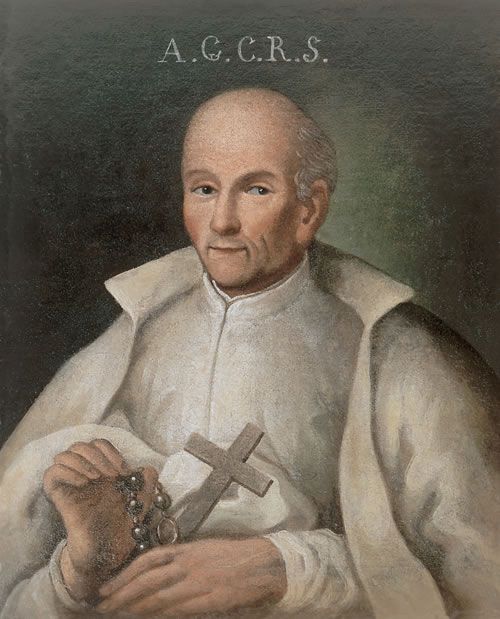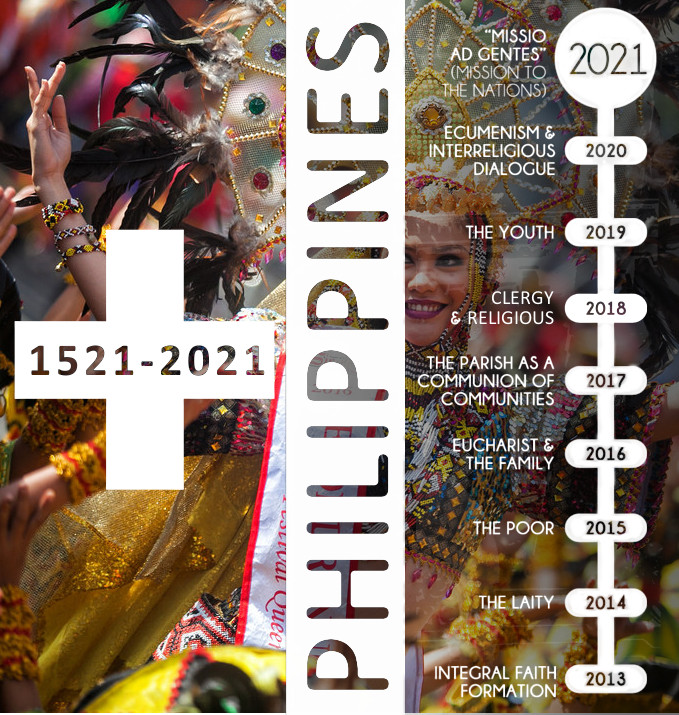
9-year plan to prepare for 500th anniversary of Gospel’s arrival to the Philippines

The Catholic Bishops’ Conference of the Philippines has issued a pastoral letter on the new evangelization (year 2012) to help prepare Catholics for 2021, the 500th anniversary of the arrival of the Gospel in the Philippines.
“We look forward with gratitude and joy to March 16, 2021, the fifth centenary of the coming of Christianity to our beloved land,” the bishops said in their July 9 letter. “We remember with thanksgiving the first Mass celebrated in Limasawa Island on Easter Sunday March 31 that same blessed year. We remember the baptism of Rajah Humabon who was given his Christian name Carlos and his wife Hara Amihan who was baptized Juana in 1521. Our eyes gaze on the Santo Niño de Cebu, the oldest religious icon in the Philippines, gift of Ferdinand Magellan to the first Filipino Catholics that same year. Indeed the year 2021 will be a year of great jubilee for the Church in the Philippines.”
The bishops continued:
In the face of a secularism which in some parts of our present world has itself become a kind of a “dominant religion,” in the face of the reality of billions who live in our time and who have not truly encountered Jesus Christ nor heard of His Gospel, how challenged we are, how challenged we must be, to enter into the endeavor of the “New Evangelization!”
We for whom Jesus has been and is truly the Way, the Truth and the Life –how can we not want and long and share Him with brothers and sisters around us who are yet to know and love Him, who are yet to receive the fullness of Life for which we have all been created, and without which their hearts will be ever restless–until they find Jesus and His heart which awaits them?
To prepare the faithful for 2021, the bishops announced “a nine-year journey for the New Evangelization,” with a different theme for each year:
- Integral Faith Formation (2013)
- The Laity (2014)
- The Poor (2015)
- The Eucharist and the Family (2016)
- The Parish as a Communion of Communities (2017)
- The Clergy and Religious (2018)
- The Youth (2019)
- Ecumenism and Inter-Religious Dialogue (2020)
- Missio ad gentes [mission to the nations] (2021)
The Philippine bishops’ initiative recalls the Polish episcopate’s “great novena” (1957-66) in commemoration of the 1,000th anniversary of the evangelization of Poland—an initiative that strengthened Catholic identity during the Communist era.
Year 2013: Integral Faith Formation.
What a blessing it is that this first pastoral priority coincides with this Year of Faith as declared by the Holy Father! Our pastoral concern goes out to the great many whose faith hardly plays a significant role in daily private and public life. We reach out during this year to those who have drifted away from the Christian faith. We note with sadness the erosion of the faith and our need for true conversion. The Sacred Scriptures and Tradition, Vatican II and the Catechism of the Catholic Church and the Catechism for Filipino Catholics will be fundamental references of the New Evangelization. This is the year of San Pedro Calungsod, who with San Lorenzo Ruiz, provides an exemplary model for the mission of the Church in the Philippines. Integral Faith Formation will focus on the “12 articles of Faith” found in the Apostles Creed. Faith Formation has one objective: a more intimate relationship between Jesus and his followers. Blessed John Paul uses the three phrases: evangelization with “new methods, new expressions, and new fervor.” In the end, the Church follows the way of holiness through conversion and discipleship.
Year 2014: Laity.
This year especially celebrates both the sacrament of Baptism by which all the faithful become God’s sons and daughters and the sacrament of Confirmation by which they become witnesses of Christ to others. Yet the gifts of the Holy Spirit through these sacraments often remain dormant. This year is to be devoted to the renewal of the laity, to their “empowerment” or more accurately to activating their charisms from the Spirit, so that they may indeed take up their role as co-responsible agents of evangelization and lead in the task of social transformation. In this regard, of paramount global importance is the ecological challenge of climate change.
Year 2015: The Poor.
This year is dedicated to committing ourselves more firmly to our vision of becoming truly a Church of the Poor. The new evangelization is also a powerful call from the Lord to follow in His footsteps to be evangelically poor. How far have we journeyed to our vision of Church? How shall we assist the materially poor to face the challenges of hunger and poverty, of globalization and climate change? And together with them eradicate the evil of corruption and the economic and political imbalances of our society? At the same time we realize that the materially poor in our midst have the God-given power to tell the story of the poor Christ who by His poverty liberates and enriches us. The whole Church, rich and poor, powerful and powerless, have to be in solidarity in the work of restoring integrity and truth, justice and peace – love – in our benighted land.
Year 2016: The Eucharist and of the Family.
This is a year of great blessing for us. The Holy Father has chosen Cebu as the host of the Fifty-first International Eucharistic Congress. We will focus our pastoral action on making the Eucharist better appreciated and its missionary implication better lived by the Catholic faithful. We shall especially emphasize on forming the Filipino Family as a Eucharistic community of parents and children, true to its name as a domestic church, rooted in the Eucharist. An evangelized family is an evangelizing family. Even as it is increasingly besieged by secularist values, the Family, as PCP-II has said, is “the focal point of evangelization.” We shall intensify our efforts to strengthen marriage and the family and to protect them from ideas and values that destroy them.
Year 2017: The Parish as a Communion of Communities.
This is a year when we more deeply discern not only the structures of governance of our dioceses and parishes but also of the quality of faith life in the parish, the fellowship, belongingness, and participation experienced by its members. In a special way we shall probe into our efforts of making the parish a communion of communities, a communion of Basic Ecclesial Communities and of covenanted faith-communities and ecclesial movements. We shall discern and implement measures on how communities of consecrated life may be more integrated into the life and mission of the parish. In brief, our focus will be the building of a parish that is truly a faith community immersed in the lives of its people.
Year 2018: Clergy and Religious.
In our culture, clergy and religious are the key to the New Evangelization. Yet they are not immune to the twin errors of a dichotomy of faith and inadequate discipleship of Christ. This is a year dedicated to the integral renewal of the values, mind-sets, behavior, and life-styles of the clergy and religious. The aim is to become servant-leaders in the manner of the Good Shepherd, live the spirit of the evangelical counsels and be authentic prophets of the Good News of Jesus and of the Kingdom. It will be a year, too, of revisiting ways of seminary and religious formation, of on-going formation, and of the collaboration of the laity in these crucial approaches to integral growth and development in view of mission and ministry.
Year 2019: Youth.
It is often said that the youth are the future of the Church. The youth are in fact the present of the Church. They are its most numerous members. They inspire us by their active participation in society and in the Church. The involvement of hundreds of thousands of young people in the various activities of evangelization and social transformation is a call to greater participation in the Church. “New methods, new expressions and new fervor” of evangelization are imperative. We shall invite the youth to discern deeply their vocation in the world and in the Church, especially the Lord’s invitation to them to the priestly and religious life. How we, as Church, respond to the aspirations of the youth will shape the third millennium.
Year 2020: Ecumenism and Inter-Religious Dialogue.
Different faiths and religions are a formidable challenge to a nation that strives to be a community, a human family, a unity in diversity. This year will be devoted to exploring new ways of being community through ecumenical and inter-religious relationships and action. Caritas in veritate, open, honest, respectful – loving – dialogue of life, prayer and action is the only way towards community. At stake are the great values of peace and harmony, particularly in areas of armed conflict, solidarity in the struggle for social change, unity in healing social ills, integrity and social justice in our land.
Year 2021: Missio ad gentes.
We are indeed proud that so many of the Filipino faithful (laity, priests, and religious) are missionaries in all the continents of the world. It is the duty of faith in Christ to tell his story to others, especially to those who have not sufficiently heard of him. Even as we are deeply inspired by the stories of Overseas Filipino Workers (OFWs) witnessing to their faith in “ad gentes” regions as well as in highly secularized countries, we need to explore new ways of assisting them as evangelizers. We have been challenged by Blessed John Paul to become the “foremost missionaries” in Asia. This year will be devoted to how we are fulfilling that vocation, how a mission-consciousness in all the faithful can be formed, how each one can be animated into becoming a missionary even at home, and more concretely how parishes and dioceses are supporting our own Philippine-Mission Society.
